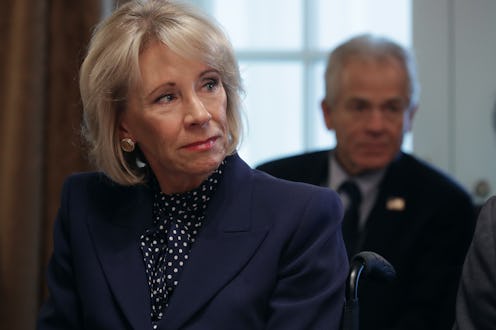News
What To Know About The School Choice Programs Betsy DeVos Is Pushing So Hard For

From the postal service, to veterans' affairs, and even education, a push toward privatization has been a running theme of the Trump administration. On Thursday, Education Secretary Betsy DeVos unveiled the Education Freedom Scholarships Opportunity Act, a plan to provide a federal tax credit that would go toward donations to private school scholarships and other "school choice" programs. So, what exactly is the school choice debate?
School choice, on its surface, is a movement to expand education options beyond traditional public schools, according to The Washington Post. It advocates that kids who don't have good public schools in their area should be able to easily access alternative education, like private schools, charter schools, and home schooling. School choice also argues that public schools should be run like businesses, subject to competition from alternative education options.
Under the Trump administration, the push for school choice has worried public education advocates, according to The Post. Critics of school choice argue that it will divert public funds away from investing in public schools, and toward private options. According to a HuffPost op-ed by Steven Singer, a teacher and education advocate, those private options aren't required to accept students of all backgrounds and often don't have the same level of oversight, the way public schools do.
From day one on the job, DeVos has remained steadfastly in favor of school choice. "What’s missing in education today is at the core of what makes America truly great: freedom," she said on Thursday, according to the Associated Press. "Kids should be free to learn where and how it works for them."
DeVos' plan would provide a 100 percent tax credit for individuals and corporations making donations (up to a set limit) toward state-approved private school scholarships and apprenticeships. According to The Post, the federal tax credits would amount to a total of $5 billion, but the proposed bill doesn't include any tax increases or spending cuts to offset the cost. Still, DeVos and her co-sponsors, Sen. Ted Cruz and Rep. Bradley Byrne, wrote in a USA Today op-ed on Thursday, "This program won't take a single cent from local public school teachers or public school students."
Even so, it already looks unlikely that DeVos' plan will successfully pass through Congress, with Democratic public school advocates arguing that public money should be invested into existing public schools, not private ones. The program is "dead on arrival," Sen. Patty Murray, the senior Democrat on the Senate Education Committee told the AP.
"Secretary DeVos keeps pushing her anti-public school agenda despite a clear lack of support from parents, students, teachers, and even within her own party," Murray said in a statement to the AP. "Congress has repeatedly rejected her privatization efforts, and she should expect nothing less here."
Opponents of school choice such as the ACLU, the National Association of Secondary School Principals, and the National School Boards Association have fought DeVos' efforts, arguing that, privatization aside, the framing of increased freedom is misleading. "School board officials support choice, and employ a lot of creative ideas to provide it," Thomas Gentzel, CEO of the National School Boards Association told NPR on Thursday, "but sending tax dollars to schools that lack local supervision is not an appropriate use of taxpayer funds."